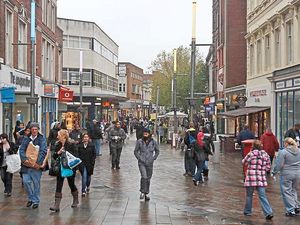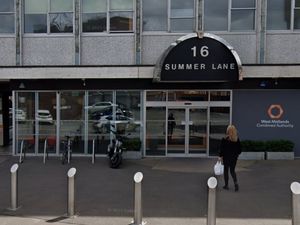Wolverhampton and Walsall among most improved areas
Wolverhampton together with neighbouring Walsall has been rated as one of the top improving places in the UK for creating new jobs.

The city is not in the top 10 for highest jobs growth in the latest Demos-PricewaterhouseCoopers Good growth for Cities index, but ranks eighth in the list of improvers.
Busines network PwC said cities in the Midlands were seeing strong jobs growth and were catching up on the historic top performers in the south of England. Birmingham head the improvers' list with Leicester in third place.
Matthew Hammond, PwC’s Midlands regional chairman and Birmingham office senior partner, said: “We’ve seen broad-based improvements in our good growth index across the Midlands, driven in particular by falling unemployment rates.
"Some areas that had lagged behind in the recovery from the financial crisis are now showing clear improvements, so the recovery and some early signs of economic re-balancing are spreading across the UK and particularly in the same areas of the Midlands.
“However, we are also seeing the price of prosperity in terms of growing pressures on scarce resources of housing, transport and skills. If regional cities are to sustain the strong recovery and performance of recent years, it will be critical to address these challenges as part of cities’ growth strategies. Key national and regional infrastructure projects combined with private sector development, such as HS2, will add momentum to the Midlands for the next decade.”
Mr Hammond said delivering good growth could not be achieved by any one person working alone, but went hand-in-hand with place based transformation, where local government, central government and the private sector acted together and worked collaboratively, to facilitate local economic growth, prosperity and wellbeing.
"There is strong evidence that devolution is creating conditions for what appear to be quick wins, but are in fact long-term growth opportunities," he added.
John Hawksworth, chief economist at PwC, said: “The UK has been a great job-creating machine in recent years and this has driven improvement in our good growth index this year across all major UK cities. On average across the UK, the index is now at its highest level since it began in 2006 and all regions have benefited from this upturn.
“But there has also been a price to pay for this in terms of worsening housing affordability, increased average commuting times and more people having to work long hours. The cities that are highest ranked on the index also tend to suffer the highest price of success.”
The sixth annual Good Growth for Cities index sets out to show that there’s more to life, work and general wellbeing than GDP. The index measured the performance of 42 of the UK’s largest cities, England’s local enterprise partnerships and the new combined authorities against a basket of 10 indicators based on the views of the public as to what is key to economic success and wellbeing.
These include employment, health, income and skills - the most important factors, as judged by the public - while housing affordability, commuting times, environmental factors and income inequality are also included, as is the number of new business starts.
Birmingham performed above average on new businesses per head, jobs, health transport and environment
The index showed that all 42 UK cities improved their score relative to the 2016 Index, driven primarily by increasing employment. In general, those cities that saw the biggest improvements in their overall score had also experienced particularly large falls in unemployment in recent years.
A reduction in housing affordability, falling owner occupation rates, rising average commuter times, and minor declines in both health and work-life balance since last year’s report suggest pressure on scarce resources such as housing, transport and labour during the recent period of economic recovery between 2013 and 2016.
Analysis of English combined authorities shows a strong performance in metro mayor cities. Three of the six newly elected mayors were elected into regions containing cities in the top 10 improvers in Birmingham, Middlesbrough and Liverpool.





